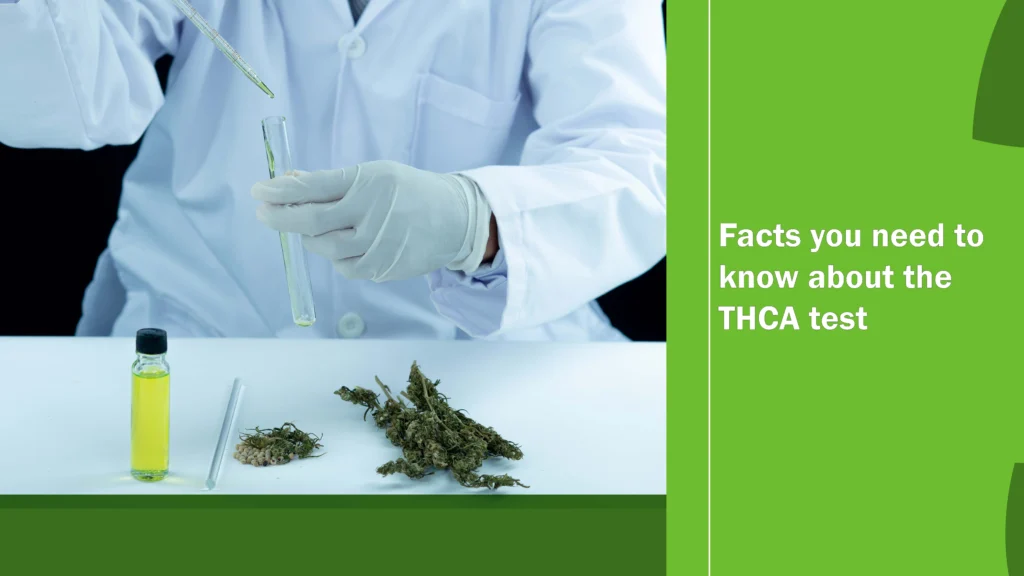Have you heard of THCA?
THCA (tetrahydro cannabinoid acid) holds properties of a non-psychoactive cannabinoid and the acidic precursor, which won’t get you high.
Many researchers have propounded the therapeutic capability of THCA in treating serious conditions, which include seizures and acute pain. While consumption of THCA is non-toxic and won’t give any euphoric effect.
Anti-inflammatory, neuroprotective, making it an intriguing aspect of scientific experiments by various medical and wellness-related backgrounds.
COMPOSITION OF THCA
As we know that cannabis goes through the extreme process of decarboxylation the cannabis THC exists in an acid form known as THCA. It is passed through tremendous heat, and after the cannabis gets decarboxylated, it loses its raw form.
The plant passes through many chemical reactions and lets transform it into different compounds. During this transition, THC won’t remain acidic (it loses its acidic properties). As the CO2 is released, it becomes chemically neutral or void.
When THCA converts into THC, after the conversion process, the THC becomes intoxicated, high, and it’s not neutral or void at all, as it possesses a strong effect and keeps hold of your mood, which may leave a potent impact on your behavior in the short term.
As we throw some light on THC and how it is processed in cannabis under the heating process to become THCA, which renders therapeutic and medicinal benefits. It’s a natural occurrence in raw cannabis and converts to THC when the flower gets processed under the influence of even a little bit of heat and sunlight.
EFFECTS OF THCA ON THE HUMAN BODY
Every change in the world of cannabis has an effect on the human body through the process of the endocannabinoid system, which affects the brain and immune system. Many studies have shown its medical implications with cannabis neuroprotection, which may help in reducing nausea.
To separate THCA and its related experience and its functionality, users need an alternative methodology, and one needs to look at the flower and separate the cannabinoids to preserve the THCA’s components.
DOES THCA SHOW UP ON DRUG TESTS?
By acknowledging the fact that THCA, as a non- psychoactive properties is a cannabis plant’s part which is ingrained in research, indicating during test is predominantly for the individual users who are intaking cannabis product, with the growing influence of the cannabis on its users, its implication on legal side has given a new dynamism. Its chemical composition includes a carboxylic acid group. Yes, it does show up on a drug test result.
WHAT DOES THCA SHOW ON A DRUG TEST?
The process of administration and intake affects the interchange of chemicalization and the procedure of decarboxylation process and metabolism which causes an effect on the drugs test result.
It isn’t the direct purpose of an ordinary drug check. This primarily displays the delta 9(THC) metabolic activities, primarily the THC-COOH, both before and after consumption is the main reflective point.
The main aim of the drug assessment is to show up the THC metabolism, basically the TCH-COOH the way and the extent to which THCA is decarbated; which shows its effects on the blood streams, the implication of THC-OOH and even the smallest amount of decarboxylation can change into a vital if the drug test possess intense sensitivity.
While people consuming a considerable level of decarboxylated THC may face detection in any test.
COMMON CHECKING METHOD DRUG TEST:
To understand the mechanism of assimilation and interchange of chemicalization of decarboxylated THCA. We need to examine and assess the cannabis metabolism, which is essential for interpreting the drug test result.
Each method gives a different paradigm check of THCA and its equivalent transitioning metabolism with varying changes and detection processes.
1. Urine assessment: this is one of the most viable methods to check the presence of THCA in your bloodstream targeting. The THC-COOH passed in the urine, which takes time of few days to weeks which differs in its usage pattern; chronic users may have positive test.
2. Blood Specimen: It gives an immediate result of cannabis usage, while detecting the THC and its process of metabolism starts immediately after consumption.
3. Hair Analysis: Hair sampling is an efficient procedure to detect if the consumer is using cannabis for a longer period of time, identifying the usage as the metabolism inclusion into the hair shaft, the hair specimen can detect the presence of the THC- COOH in complex 90 days, providing a comprehensive look out of drug history.
CONCLUSION:
The THC(Tetrahydrocannabinol) is believed to be a prominent mind-changing and transitioning element, which may also be seen as an active ingredient found in marijuana. There are numerous options and techniques to consume cannabis, holding different levels of effect on the human body and potency as compared with other cannabinoids THCA is rare amongst all.
If heated, it gets transformed into THC, and its properties become neutral or void. It is considered less convenient than other cannabinoids; many intake it for therapeutic properties and non-psychoactive effects. One needs to be very cautious while consuming even the smallest amount of THCA cannabinoids, as it does get detected.

